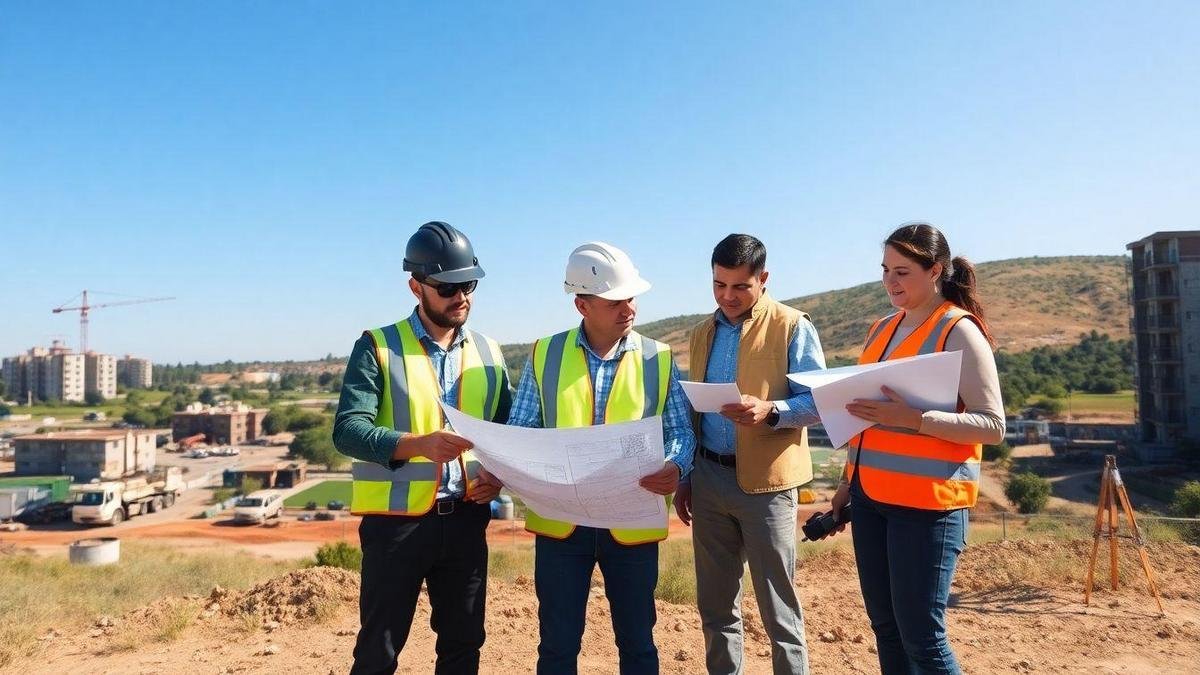The land due diligence process is essential for anyone looking to invest in property. It helps uncover risks, ensure compliance, and protect investments. A thorough understanding of this process is crucial. This article will guide you through the key steps, the importance of property assessments, title searches, environmental analysis, and much more. By grasping these concepts, investors can make smarter decisions and navigate the complexities of land transactions with confidence.
Key Insights
- Understand local laws and regulations before buying land.
- Check for any liens or debts on the property.
- Investigate property boundaries and lot lines.
- Review environmental reports for land use issues.
- Talk to neighbors to learn about the area.

Understanding the Land Due Diligence Process
Key Steps in the Land Due Diligence Process
The land due diligence process is critical for any investor looking to make informed decisions. It involves several key steps that help assess the viability of a property. Here are the main steps:
- Preliminary Research: Investors should start by gathering information about the property, including zoning regulations, land use, and any restrictions that may apply. Familiarizing oneself with zoning laws is particularly important.
- Site Inspection: A physical visit to the property is essential to see the land firsthand and identify any potential issues.
- Environmental Assessments: Conducting environmental studies is vital to identify contamination or environmental hazards that could affect the property. Understanding feasibility studies can aid in this process.
- Legal Review: Investors must review legal documents related to the property, including title deeds, easements, and any pending litigation.
- Financial Analysis: A thorough financial review helps assess the property’s value and potential return on investment, including analyzing market trends and comparable sales. This is where tools for calculating returns can be beneficial.
- Final Report: After completing these steps, a comprehensive report should be prepared to summarize findings and provide recommendations.
Importance of a Thorough Property Assessment
A thorough property assessment is essential for several reasons. It helps investors:
- Identify Risks: Understanding potential risks allows investors to make informed decisions, including financial liabilities or environmental concerns.
- Maximize Investment Potential: A detailed assessment can reveal opportunities for development or enhancement, ultimately increasing property value.
- Facilitate Negotiations: Knowledge gained from the assessment can strengthen an investor’s position during negotiations.
Benefits of a Comprehensive Due Diligence Process
A comprehensive due diligence process offers numerous benefits:
| Benefit | Description |
|---|---|
| Risk Mitigation | Reduces the chances of unexpected issues arising after purchase. |
| Informed Decision Making | Provides a clear picture of the property’s value and potential. |
| Cost Savings | Helps avoid costly mistakes that could arise from uninformed investments. |
| Enhanced Negotiation Power | Equips investors with data to negotiate better terms and prices. |
In summary, a diligent approach to property assessment is not just a formality; it is a fundamental step in the investment journey. It empowers investors with knowledge, helping them make sound decisions in a competitive market.

The Role of Title Search in Land Acquisition
What is a Title Search?
A title search is a detailed examination of the history of a piece of land. It looks into who owns the property, any claims against it, and any legal issues that may arise. This process is crucial for anyone considering purchasing land, as it helps uncover any liens, mortgages, or easements that may affect ownership.
A title search typically involves reviewing public records, including deeds, tax records, and court documents. By doing this, investors can gain clarity on the property’s history and current standing.
How Title Search Affects Investment Risk
Conducting a thorough title search can significantly lower investment risks. If an investor skips this step, they may face unexpected problems after the purchase, including disputes over ownership or hidden debts tied to the property.
Here’s how a title search can impact investment risk:
| Risk Factor | Impact of Title Search |
|---|---|
| Ownership Disputes | Identifies previous owners and claims. |
| Hidden Liens | Reveals any debts attached to the property. |
| Legal Issues | Uncovers any ongoing lawsuits related to the land. |
By understanding these factors, investors can make informed decisions and avoid costly mistakes.
Ensuring Clear Ownership Through Title Searches
To maintain clear ownership, a title search is indispensable. It acts as a safeguard against future disputes. When investors verify that the title is free of complications, they can move forward with confidence.
For example, imagine an investor who skips the title search. After purchasing, they discover a lien from a previous owner, leading to financial loss and legal headaches. Conversely, those who conduct a title search can confidently invest, knowing they have the right to the property without hidden surprises.

Environmental Analysis: A Critical Component
Why Environmental Analysis Matters
Environmental analysis plays a vital role in land development. It helps investors identify potential risks and opportunities associated with a property. By understanding the environment, they can make informed decisions that protect their investments. This process is essential for ensuring that projects comply with local regulations and sustainable practices. Failing to conduct a thorough analysis can lead to costly mistakes down the road.
Common Environmental Issues to Investigate
When conducting an environmental analysis, several key issues should be investigated:
- Soil Quality: Assessing the soil’s condition is crucial. Contaminated soil can hinder development and pose health risks.
- Water Resources: Evaluating nearby water bodies helps determine if they are at risk of pollution or flooding.
- Wildlife and Habitats: Understanding local wildlife and habitats can prevent disruptions to ecosystems.
- Air Quality: Monitoring air quality is essential for health and compliance with regulations.
| Environmental Issue | Importance |
|---|---|
| Soil Quality | Affects construction and health |
| Water Resources | Impacts flooding and pollution |
| Wildlife and Habitats | Protects local biodiversity |
| Air Quality | Ensures health and regulatory compliance |
Protecting Investments with Environmental Assessments
Conducting environmental assessments is a smart move for investors. These assessments help identify potential issues before they become significant problems. For example, if a property is found to have contaminated soil, investors can either negotiate a lower price or walk away from the deal entirely. This proactive approach not only safeguards investments but also aligns with responsible development practices.

Regulatory Compliance in Land Development
Understanding Local Zoning Laws
Local zoning laws are crucial in land development. They dictate how land can be used and what can be built on it. By understanding these laws, developers can avoid costly mistakes. Zoning laws can vary widely from one area to another. For instance, some areas may allow residential buildings, while others may only permit commercial use. Familiarizing oneself with zoning classifications can provide clarity.
Here are some common zoning classifications:
| Zoning Type | Description |
|---|---|
| Residential | Areas designated for housing and living spaces. |
| Commercial | Zones for businesses and retail establishments. |
| Industrial | Areas for manufacturing and heavy industry. |
| Agricultural | Land reserved for farming and agricultural activities. |
Developers must conduct thorough research to understand these regulations. This knowledge helps them make informed decisions and plan their projects effectively.
The Impact of Regulations on Property Valuation
Regulations can significantly affect property valuation. When a property is compliant with local laws, it often has a higher market value. Conversely, properties that do not meet these requirements may face lower valuations or even legal issues.
For example, if a developer builds a structure that violates zoning laws, they may incur fines or be forced to demolish the building, leading to a substantial loss of investment.
To illustrate, consider a property valued at $1 million in a commercial zone. If changes in regulations shift it to a residential zone, the value might drop to $700,000. Understanding these impacts is essential for investors looking to maximize their returns.
Navigating Compliance for Successful Development
Navigating compliance can seem overwhelming, but it is vital for successful land development. Here are some steps to help streamline the land due diligence process:
- Research Local Zoning Laws: Start by gathering information on zoning regulations in the area.
- Consult with Experts: Engage with local planners or legal experts to clarify any uncertainties.
- Prepare Documentation: Ensure all plans and permits are in order before starting construction.
- Stay Updated: Regulations can change, so staying informed about any updates is crucial.
By following these steps, developers can reduce risks and enhance their chances of success.

Evaluating Property Valuation Techniques
Methods for Accurate Property Valuation
When assessing land value, several methods come into play. Each method has its own strengths and weaknesses, but they all aim to provide a clear picture of what a property is worth. Here are some common techniques:
- Comparative Market Analysis (CMA): This method compares the property to similar ones that have recently sold in the area, helping gauge its potential value.
- Income Approach: This technique estimates value based on the income the property can generate, often used for rental properties.
- Cost Approach: This method calculates the cost to replace the property, minus depreciation, determining how much it would cost to build the same property from scratch.
| Method | Best For | Key Consideration |
|---|---|---|
| Comparative Market | Residential Properties | Recent sales data |
| Income Approach | Investment Properties | Rental income potential |
| Cost Approach | Unique Properties | Replacement cost |
Factors Influencing Land Value
Land value does not exist in a vacuum; various factors play a crucial role in determining it. Understanding these can help investors make informed decisions. Some key elements include:
- Location: Prime locations often command higher prices. Access to amenities, schools, and transportation can significantly boost value.
- Zoning Regulations: The type of permitted use can affect land value. Properties zoned for commercial use may be worth more than those designated for residential use.
- Market Trends: Economic conditions, interest rates, and demand can fluctuate, impacting property values. Keeping an eye on these trends is essential for savvy investors.
Enhancing Investment Decisions Through Valuation
Valuation is not just a number; it is a tool that can enhance investment decisions. By understanding the true value of a property, investors can make choices that align with their financial goals.
For instance, if an investor identifies a property undervalued due to poor marketing, they may seize the opportunity to acquire it at a lower price. This insight can lead to a profitable investment. Additionally, regular assessments can help investors stay ahead of market changes, ensuring they make informed decisions.
In the land due diligence process, accurate valuation is vital. It lays the groundwork for successful investments and helps mitigate risks. By leveraging these techniques and understanding the factors at play, investors can navigate the complexities of property valuation with confidence.

Identifying Investment Risks in Land Deals
Common Risks in Real Estate Investment
Investing in land can be a lucrative opportunity, but it comes with its fair share of risks. Understanding these risks is vital for any investor looking to make informed decisions. Here are some common risks associated with real estate investment:
- Market Fluctuations: The real estate market can change rapidly. Prices may rise or fall based on economic conditions, affecting the value of land.
- Zoning Issues: Local regulations can restrict how land can be used. Zoning laws may change, impacting future development plans.
- Environmental Concerns: Land may have hidden environmental issues, such as contamination or endangered species habitats, which can lead to costly remediation.
- Financing Risks: Securing funding for land deals can be challenging. Interest rates and lending standards can shift, affecting the cost of borrowing.
- Title Problems: Disputes over land ownership or unclear titles can create legal headaches for investors.
Strategies to Mitigate Investment Risks
To navigate these risks, investors can adopt several strategies. Here are some effective methods:
- Conduct Thorough Research: Before investing, perform a comprehensive land due diligence process. This includes checking local zoning laws, environmental assessments, and market trends. Utilizing resources like development guides can be helpful.
- Engage Professionals: Hiring real estate agents, lawyers, and environmental consultants can provide valuable insights and help avoid pitfalls.
- Diversify Investments: Spreading investments across different types of properties can reduce exposure to any single risk.
- Stay Informed: Keeping up with market trends and regulatory changes can help investors adapt quickly to new challenges.
Building a Risk Management Plan for Investors
Creating a risk management plan is essential for investors. This plan should outline potential risks and the strategies to address them. Here’s a simple framework to consider:
| Risk | Mitigation Strategy |
|---|---|
| Market Fluctuations | Diversify investments |
| Zoning Issues | Consult local planning authorities |
| Environmental Concerns | Conduct environmental assessments |
| Financing Risks | Establish relationships with lenders |
| Title Problems | Secure title insurance |
By developing a clear risk management plan, investors can position themselves to handle challenges effectively and protect their investments.

The Importance of Due Diligence in Global Markets
Challenges in International Land Transactions
Investing in land across borders presents numerous challenges. Different countries have varying laws, regulations, and cultural practices that can complicate transactions. Investors may face:
- Legal hurdles: Understanding local laws can be tricky. Some countries have strict rules about foreign ownership.
- Market volatility: Economic conditions can change rapidly, affecting land values.
- Cultural differences: Misunderstandings can arise if investors are not familiar with local customs and practices.
These factors can create a minefield for investors who are not prepared. The land due diligence process becomes essential to navigate these challenges successfully.
Adapting Due Diligence for Global Investors
To tackle the complexities of international land transactions, investors must adapt their due diligence strategies. This involves:
- Researching local laws: Knowing the legal landscape is crucial. Investors should seek local experts to guide them.
- Assessing market conditions: Understanding economic trends can help in making informed decisions.
- Building local connections: Establishing relationships with local stakeholders can provide valuable insights.
Investors should tailor their approach to fit the specific market they are entering. A one-size-fits-all strategy simply won’t work in diverse environments.
Ensuring Success in Diverse Markets Through Diligence
Success in global markets hinges on thorough due diligence. Here are some key steps to follow:
| Step | Description |
|---|---|
| Identify Risks | Recognize potential challenges in the target market. |
| Gather Information | Collect data on local laws, market trends, and customs. |
| Consult Experts | Engage with local professionals for guidance. |
| Evaluate Opportunities | Analyze potential benefits and drawbacks of the investment. |
By following these steps, investors can navigate the land due diligence process with confidence. Each step is designed to uncover vital information that can lead to successful investments.

Streamlining the Land Due Diligence Process
Tools and Resources for Efficient Due Diligence
In today’s fast-paced investment landscape, effective tools and resources are essential for conducting the land due diligence process. Investors can leverage various platforms and software to simplify research and analysis. Some valuable tools include:
- GIS Software: Geographic Information Systems (GIS) assist in visualizing land data, helping investors assess location specifics.
- Online Databases: Access to property records, zoning laws, and environmental assessments can be found in online databases, streamlining the search process.
- Project Management Tools: These tools help organize tasks, timelines, and team collaborations, ensuring that nothing slips through the cracks.
These resources not only save time but also provide a clearer picture of potential investments.
Best Practices for Investors
To navigate the land due diligence process successfully, investors should follow certain best practices:
- Conduct Thorough Research: Investors must investigate local laws, market trends, and environmental issues to avoid surprises later.
- Engage Local Experts: Collaborating with local real estate agents or legal advisors can provide insights that a remote investor might miss.
- Document Everything: Keeping detailed records of findings and communications can protect investors from future disputes.
These practices help build a strong foundation for any investment decision.
Maximizing Efficiency in the Due Diligence Process
To maximize efficiency during the land due diligence process, investors can:
| Strategy | Description |
|---|---|
| Set Clear Objectives | Define what information is critical for decision-making. |
| Create a Checklist | Use a checklist to track necessary documents and tasks. |
| Leverage Technology | Utilize apps and software to streamline data collection and analysis. |
By implementing these strategies, investors can reduce the time and effort involved in due diligence, allowing them to focus on making informed decisions.

The Future of Land Due Diligence
Trends Shaping the Due Diligence Landscape
The land due diligence process is evolving rapidly. Investors are now focusing on sustainability, transparency, and technology. These trends are not just buzzwords; they are reshaping how investors assess land opportunities.
- Sustainability: More investors are looking for eco-friendly developments. They want to know how land use impacts the environment.
- Transparency: Investors demand clear information. They want to see all details before making decisions.
- Data-Driven Decisions: Using data analytics helps investors make informed choices. They can assess risks and opportunities better.
Technology’s Role in Modern Due Diligence
Technology plays a crucial role in the land due diligence process. It helps streamline tasks and provides valuable insights. Here are some tools that are changing the game:
| Technology | Purpose |
|---|---|
| Geographic Information Systems (GIS) | Helps visualize land data and assess its potential. |
| Drones | Provides aerial views for site assessments. |
| Blockchain | Ensures secure and transparent transactions. |
These tools make the process faster and more efficient. Investors can now gather information quickly and accurately.
Preparing for Changes in the Land Due Diligence Process
As the landscape changes, investors must adapt. Here are some ways to prepare for these shifts:
- Stay Informed: Keeping up with industry news is vital. Changes in regulations and technology can impact decisions.
- Invest in Training: Understanding new tools and methods is key. Training can lead to better assessments and outcomes.
- Network with Experts: Building relationships with professionals in the field can provide insights and guidance.
By embracing these changes, investors can navigate the complexities of land acquisition with confidence.
Conclusion
In conclusion, the land due diligence process is a fundamental pillar for successful property investment. By meticulously following each step—from conducting thorough property assessments to understanding local zoning regulations—investors position themselves to make informed decisions. The insights gained through this process not only help in mitigating risks but also enhance the potential for maximizing returns. As the landscape of land investment continues to evolve, embracing technology and staying abreast of market trends will be crucial for navigating future challenges. For those eager to delve deeper into this topic and explore more valuable resources, visiting Land Development Hub will provide a wealth of information to further empower their investment journey.

No responses yet